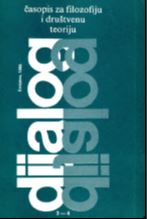UNIVERZALNI PRESKRIPTIVIZAM I KATEGORIČKI IMPERATIV
UNIVERSAL PRESCRIPTIVISM AND CATEGORICAL IMPERATIV
Author(s): Jasminka Babić-AvdispahićSubject(s): Ethics / Practical Philosophy, Contemporary Philosophy, German Idealism
Published by: Akademija Nauka i Umjetnosti Bosne i Hercegovine
Keywords: Immanuel Kant; categorical imperative; R. M. Hare; ethics; prescriptivism; Universal precriptivism;
Summary/Abstract: It seems that Harre's reference to Kant starts from the presupposition that categorical imperative is only a formal principle whose content is separable from it. If one takes the pattern of the natural law as adequate for interpretation of the fundamental pattern of categorical imperative, then it can be equated with Harre's principle of universibility. However, the pattern of autonomy is fundamental for the explication of categorical imperative because it points out the origin of categorical imperative, and the issue of the acquired universality. Also, it can be proved that the fundamental pattern of the categorical imperative is equivalent to the pattern of purposfullness, namely that the formal formulation of the categorical imperative cannot be separated from the content. On the other hand, since Kant took categorical imperative as a cryterion for moral evaluation of maxim of acting, the author reconsiders the possibility of utilitarian interpretation of Kant's test of universalism. If that could be possible then Harre's thesis on the synthesis of utilitarianism and dentic ethic would not be surprising but rather found in Kant's works. However, the categorical imperative cannot be equated with the argument of generalization (what would happen if everyone did that?) nor with the argument of the golden rule, because they examine only the legitimacy of action and Kant's test of universality on the other hand, refers to morality of maximes. Harre's utilitarian strategy, defined by an argument of the golden rule, aims for the general, but this generality is not Kantian,
Journal: Dijalog - Časopis za filozofiju i društvenu teoriju
- Issue Year: 1988
- Issue No: 03+04
- Page Range: 93-105
- Page Count: 13
- Language: Bosnian

